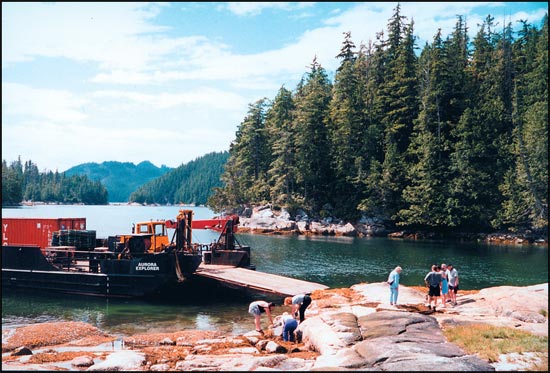On the job
Real world people working on the water
Authored by: Margaret Boyes
Brought to you by www.dieselduck.net, comments to [email protected]
Ron Stevenson, Skipper, Marine Link Transportation
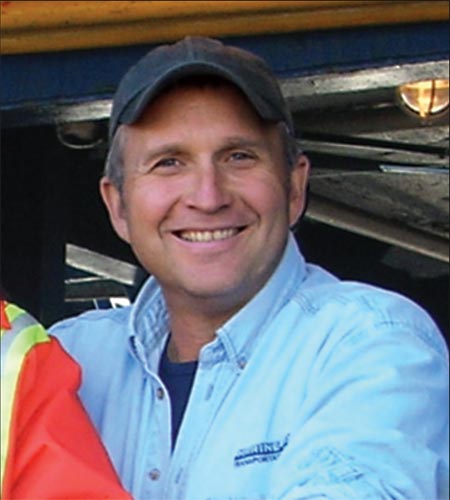 Ron
Stevenson is captain of the Aurora Explorer, a 132-foot landing
craft owned by Marine Link Transportation. The company delivers
freight and carries cruise passengers up and down the British
Columbia coast. Because the Aurora Explorer takes passengers and
runs on a fixed schedule, its crewmembers have definite days off and
can plan their lives. Mariner Life caught up with Stevenson to find
out what it takes to skipper a coastal freighter, and what it's like
hosting passengers on board a working vessel.
Ron
Stevenson is captain of the Aurora Explorer, a 132-foot landing
craft owned by Marine Link Transportation. The company delivers
freight and carries cruise passengers up and down the British
Columbia coast. Because the Aurora Explorer takes passengers and
runs on a fixed schedule, its crewmembers have definite days off and
can plan their lives. Mariner Life caught up with Stevenson to find
out what it takes to skipper a coastal freighter, and what it's like
hosting passengers on board a working vessel.
On The Job: Tell us about your position. How long have you been doing it, and what are some of the challenges?
Ron Stevenson: I work as a captain for Marine Link Transportation
which is a coastal freight service out of Menzies Bay. Over the
years the company has had numerous different vessels and now we have
two barges for moving freight. I work on a 305-ton, flat bottomed,
132-foot landing craft called the Aurora Explorer. We deliver
freight up and down the coast to logging camps, fish farms and
resorts. We also take 12 passengers at a time out on five-day trips.
They tag along when we
deliver freight. It’s been a great combination, passengers and
freight. The passengers really enjoy being on a working vessel and
watching the freight get delivered. There are tidal challenges, and
depending on the type of freight we’re delivering it can be quite
interesting. We’ve been taking passengers for 14 years. I’ve been on
it since the beginning and have been master now for 12 years.
OTJ: Why did you choose this job? What route have you taken in terms of education and experience?
Stevenson: This job basically chose me. I started my life on the water - when I was five my parents had a fishing resort in Courtenay and Campbell River and I grew up on the water. I was fishing commercially when I was 15. After doing that for a few seasons I got off the water for awhile but missed it terribly. When I was 27 I went back to sea and began working for Marine Link. I also got my Fishing Masters’ 4 when I was 27 but worked as a fisherman for only three seasons. I got my Mates’ ticket in 1992 and worked as a mate for a while then got my command endorsement in 1996 through North Island College and the Marine Training Institute in North Vancouver which is now BCIT.
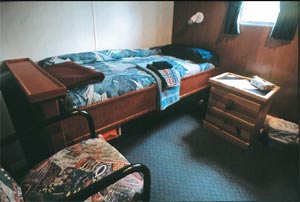 OTJ: Does working
for Marine Link mean more security and a better schedule than
fishing?
OTJ: Does working
for Marine Link mean more security and a better schedule than
fishing?
Stevenson: For sure. Not many freight boats on the coast leave and come back at definite times. When we have passengers we’re scheduled and know exactly what days we’ll have off. It’s a really nice setup. With fishing you’re gone for months on end. Other vessels delivering freight on the coast don’t know how long they’re going to be gone either. They have a rough idea. When you know you’ll be home on a certain day you can plan your life.
OTJ: What does it take to be successful in your job?
Stevenson: Lots of patience - what else can I say? You have to pay attention to what you’re doing all the time. You can’t waver too much. You have to keep her off the rocks. And on the Aurora you need the gift of gab too. We have an open wheelhouse policy and there are many passengers up in the wheelhouse. We spend a lot of time talking to them. If you’re not a people person it wouldn’t be a good job for you. But I enjoy talking to people. I meet lots of interesting folks, mostly from BC but also from the USA and Great Britain and Australia and Ontario and all over the world. That’s the really nice part about it.
OTJ: Does the rising Canadian dollar mean you have fewer American tourists?
Stevenson: I think it has impacted us negatively. I’m not sure what the percentage was before but we have fewer Americans coming on board now. Our business is still good in spite of this.
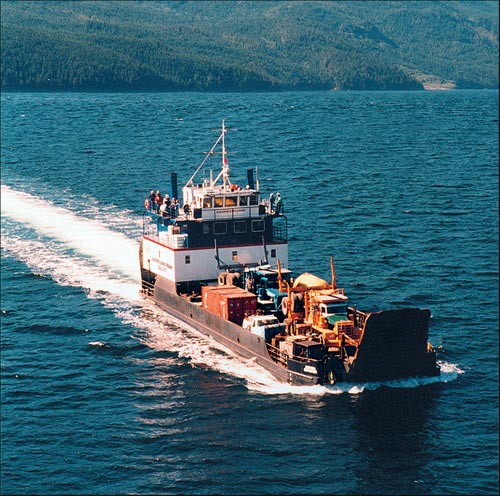
OTJ: If you could change anything about your job what would it be?
Stevenson: [Laughs] Oh, no, my boss might see this! Actually, I can’t really think of anything. More money is always nice - less work and more pay. How’s that? That’s what everyone wants.
OTJ: What are your aspirations for the future in your career? Where would you like to be?
Stevenson: Right now I’m looking into the Pacific Pilotage program. I’ve been going out as an observer on the freighters. That’s the direction I’m headed in and now that’s within my sight. Pilots go onto all the ships coming into inland Canadian waters and guide them into port. I think I have the second best job on the coast and pilots have the best. What appeals to me about it is the challenge. Just getting into the Pilot’s Authority would be a huge accomplishment. I think it would be very rewarding to bring a ship in and be able to dock it safely. It really appeals to me. The Pilots’ Authority is a private business, not the government.
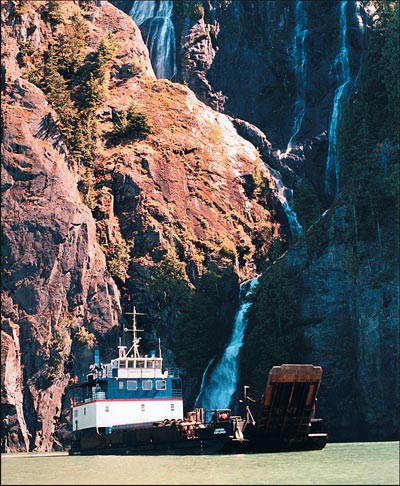 OTJ: What has been
the most memorable moment on your job?
OTJ: What has been
the most memorable moment on your job?
Stevenson: Gosh, there have been so many.... Probably the first time I went up to the head of Knight Inlet. It’s such a spectacular, beautiful place. So is Bute Inlet. I’ll never forget the first time I saw that part of the coast.
OTJ: If you weren’t doing this, what would you be doing?
Stevenson: Oh, boy! I don’t know [Laughs]. If I was retired, I’d do a lot of mountain biking and skiing and spend time with my family.
OTJ: Tell us about some people in your line of work that you admire or look up to.
Stevenson: Greg James, one of the first skippers I ever worked with, is a great guy and taught me a lot. Another fellow I admire is Philippe Menetrier. He’s another skipper on the Aurora and a really good guy. Some others are the coastal pilots I’ve gone out with. I look up to all of them. They’re very professional and a really good bunch. I aspire to be in that group one day.
OTJ: Do you have any advice for people who want to do what you do?
Stevenson: Your heart has to be in it. Otherwise you’re not going to adapt and you won’t enjoy it. Once it’s in your blood you can’t leave. You have to enjoy what you’re doing. Getting your tickets is a good thing. It’s a real sense of security to have a ticket in your pocket. When I first did my marine training I was worried that I wouldn’t be able to do it. But I pulled it off and the feeling of accomplishment was wonderful. You always know you can do a better job. Never give up. It’s easy to give up. Some guys give up who probably would have made it.
OTJ: Is there anything else you’d like to say to Mariner Life’s readers?
Stevenson: I’d like to say this to all my fellow mariners: Let’s try to get along out there. It’s a great thing when people get along and work things out and communicate. When there’s good communication on the water, everything should be safe.
